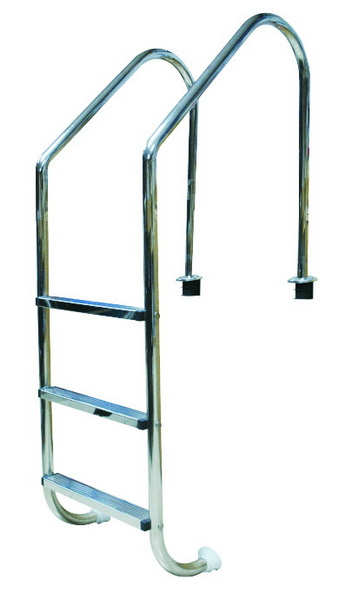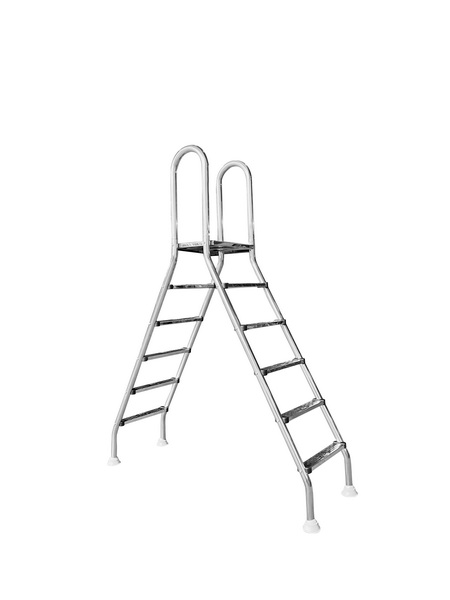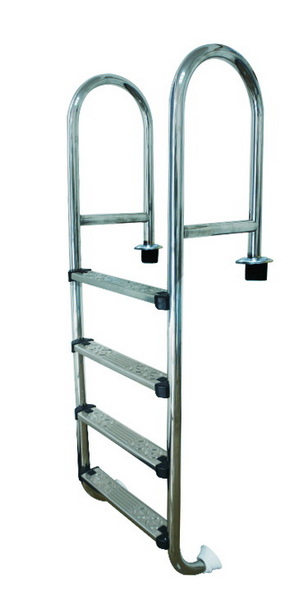Views: 222 Author: Tina Publish Time: 2025-09-24 Origin: Site








Content Menu
● Understanding the Importance of Pool Ladder Stability
● Types of Above Ground Pool Ladders and Stability Concerns
● Step-by-Step Guide: How to Secure an Above Ground Pool Ladder
>> 1. Follow Manufacturer Instructions
>> 3. Anchor Ladder to Deck or Pool Frame
>> 4. Use Ladder Mats or Non-Slip Pads
>> 5. Add Weights to Keep Ladder Down
>> 6. Use Pool Noodles or Foam Rods
>> 7. Apply Waterproof Sealant (When Needed)
>> 8. Secure Lightweight Ladder Bases
● Safety Features and Recommendations
● Ongoing Maintenance for Pool Ladder Security
● Bonus Safety Layers for Above Ground Pools
>> 1. How can I stop my above ground pool ladder from floating?
>> 2. What is the safest type of above ground pool ladder?
>> 3. How often should ladder bolts or screws be checked?
>> 4. Can pool ladders be permanently secured?
>> 5. What extra steps can prevent unauthorized pool access?
Stabilizing a pool ladder reduces the risk of injury or accidents caused by wobbling, slipping, or sudden shifting. According to U.S. Consumer Product Safety Commission (CPSC), thousands of emergency room visits each year are related to faulty or unstable pool equipment, including ladders. Ensuring correct installation and ongoing maintenance should be at the core of every pool owner's checklist.[2][3][1]
Why secure your above ground pool ladder?
- Prevents ladder rocking or sliding, especially for lightweight or plastic models.
- Protects swimmers (especially kids and elderly) from falls or slips.[4][2]
- Ensures compliance with safety standards and insurance requirements.
- Extends the service life of your pool equipment.

Deck-mounted ladders are directly bolted or anchored into wooden or concrete pool decks. Proper use of anchor brackets, drilled into the deck using all available mounting holes, ensures high stability.[2]
A-frame ladders are freestanding, creating a bridge from ground to pool. Their stability relies on a wide, level base; uneven terrain can cause wobble unless addressed with additional supports.[3][2]
These are mounted directly to the pool wall, offering several secure attachment points. Wide, non-slip steps distribute weight, making this design suitable for all ages and abilities.[4][2]
Safety ladders come with removable or lockable steps to limit unauthorized access, ideal for households with small children.[4]
Carefully assemble and install the ladder per instructions. Confirm all bolts, nuts, and fasteners are tightly secured. Use nylon locking nuts where provided for added strength.[5][2]
Use a spirit or laser level to ensure that the ladder's base sits flat and evenly on all points. Uneven ground can cause the ladder to rock, so place shims or cut pool noodles underneath feet where necessary for micro-adjustments.[1][2]
For deck-mounted models:
- Drill and install anchor brackets at each mount point using all provided bolt holes.
- Re-check for tightness after one week of use.
- Use extra screws or lag bolts in weak or high-stress areas under the deck.[7][2]
For A-frame ladders:
- Attach provided braces to the pool's top ledge as per instructions ().[6]
- If allowed, secure ladder feet with weatherproof cable ties or anchor to weighted baskets for additional resistance.[2]
Place a non-slip rubber ladder mat, or pool step pad, under the feet of the ladder. This increases traction, protects the pool liner, and prevents side-to-side shifting.[2]
For ladders or steps that tend to float:
- Insert weighted sandbags or custom PVC weights inside the hollow ladder legs.[8][3]
- Pour sand into built-in fill ports, then cap securely ().[9][6]
- Never use dense, heavy metal weights, as these may damage the pool liner.
Place pool noodles or thick foam rods under the rear ladder legs. This adds traction and a slight lift, preventing excessive pressure and improving grip.[1][2]
Image Reference:
- Foam rod technique for extra stability ()[1]
In deck-mounted or wall-mounted installations, apply waterproof silicone sealant at all joint seams for added corrosion protection and to fill micro gaps.[2]
If using a lightweight plastic or resin ladder, secure the base using zip ties or cable straps, anchoring them to a permanent point such as a deck rail, pool post, or weighted basket.[2]

- Ensure all steps and rails are equipped with non-slip surfaces.[4]
- Handrails should be present on both sides, and all bolts or edges should be covered or trimmed.[4][2]
- Remove or lock the ladder when the pool is not in use to prevent unsupervised access by children or pets.[10][4]
- Maintain regular inspections for signs of wear, rust, or loose hardware.
- Inspect and tighten bolts or screws weekly during pool season.[2]
- Shake the ladder gently side-to-side before each use to detect any excess movement.[2]
- Replace worn ladder feet and pads as soon as they lose grip.
- Reapply silicone sealant after severe weather or mechanical stress.
- Store removable ladders indoors during the offseason to prevent weather damage.
- Install a fence or barrier around the pool to control access.[11]
- Use alarms (door, window, or pool surface) for added notification if the area is breached.[3]
- Always supervise children, and ensure at least one adult in the household has basic CPR and first aid training.[11][3]
Securing an above ground pool ladder is a multi-step process essential for both user safety and equipment longevity. By carefully selecting the most suitable ladder type, following proper installation methods, employing stabilization accessories like mats, weights, and foam rods, and diligently maintaining all fixtures, pool owners can minimize risks and improve the swimming experience for everyone. Always prioritize safety—especially in households with children, pets, or elderly members—and supplement stable ladders with added layers of protection, such as fences and alarms. These best practices ensure a safe, enjoyable, and trouble-free pool season year after year.[3][9][1][2]

- Use sandbags, PVC weights, or fill hollow legs with sand to ballast the ladder.[9][3][8]
- Deck-mounted or in-pool ladders with wide, non-slip steps, double handrails, and locking barriers offer the best safety.[13][4][2]
- Weekly during pool season and after any major weather events.[2]
- Deck-mounted ladders can be permanently bolted; A-frame models often rely on weighted stabilization but can be anchored with extra hardware.[7][2]
- Remove or lock the ladder when not in use, use safety latches or deck gates, and install fences and alarms around the pool perimeter.[10][11][4]
[1](https://blog.watsons.com/blog/make-above-ground-pool-ladder-stable)
[2](https://www.poolkingfilter.com/how-to-keep-pool-ladder-from-moving.html)
[3](https://poolfence.com/pool-ladders-a-step-toward-safety/)
[4](https://www.poolfencediy.com/blogs/blog/pool-ladder-safety)
[5](https://www.youtube.com/watch?v=JJkG7vsan1E)
[6](https://www.youtube.com/watch?v=ioYl-25dDXY)
[7](https://poolpartstogo.com/blogs/pool-equipment/how-to-fit-a-ladder-to-your-above-ground-pool-the-right-way)
[8](https://www.youtube.com/watch?v=Nb82H39bU0g)
[9](https://www.thepoolfactory.com/blogs/equipment/how-prevent-pool-steps-from-floating)
[10](https://aurorapoolsknoxville.com/above-ground-pool-safety/)
[11](https://www.thepoolfactory.com/blogs/equipment/make-your-pool-safer-simple-steps)
[12](https://www.youtube.com/watch?v=zBgR_gj8NGg)
[13](https://blog.grepool.com/en/articles/safety/what-type-of-ladder-to-choose-for-an-above-ground-pool/)
[14](https://www.reddit.com/r/AboveGroundPools/comments/13q494j/securing_pool_steps_no_drilling/)
[15](https://sternspools.com.au/blogs/help-advice/easy-access-a-guide-to-above-ground-pool-ladders)
[16](https://www.reddit.com/r/pools/comments/13ap2l4/advice_how_to_fix_ladder_mount/)
[17](https://journals.sagepub.com/doi/abs/10.1177/1541931215591278)
